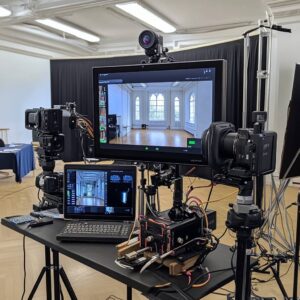Best mixer for small churches
Best Mixer for Small Churches
Choosing the right audio mixer for your small church can feel daunting, especially when balancing the desire for quality worship experiences with the practical realities of budget constraints and volunteer technical teams. Every service is an opportunity to connect and uplift, and the clarity of sound plays a pivotal role in delivering the message and fostering community. Yet, with so many options on the market, it’s easy to feel overwhelmed by technical jargon and the fear of making an expensive mistake. How, then, does one find the best mixer for small churches?
This guide is crafted with your unique needs in mind. We aim to demystify the process of selecting a mixer that fits your budget and enhances your worship services, making them as impactful and inclusive as possible. Whether upgrading your existing system or starting from scratch, this article is your starting point to ensure that every sermon, hymn, and announcement is heard as clearly as intended.
Mixer Overview: The What and Why
The mixing console, or audio mixer, is an essential component in a church sound system, serving as the heart through which all sounds flow and blend. At its core, a mixer allows for individual control of sound levels, inputs, and outputs, ensuring that every note of music, spoken word, and hymn reaches the congregation with clarity and balance. In a church context, where services are imbued with significance and every message carries weight, the ability to deliver clear and emotionally resonant sound is paramount.
Audio mixers come in various sizes and configurations, from simple units with a handful of channels to complex consoles designed for orchestral arrangements. For small churches, the choice of mixer influences not just the quality of sound but also the ease with which volunteers can operate the system. It’s about finding the right balance between functionality and simplicity, ensuring that technology enhances, rather than hinders, the worship experience.
Understanding the role of an audio mixer in your church’s sound system is the first step toward creating memorable, engaging services. It’s not just about amplifying voices or music; it’s about shaping the auditory landscape of worship, making every service an immersive, inclusive experience for all attendees.
Factors to Consider When Choosing a Mixer for Your Small Church
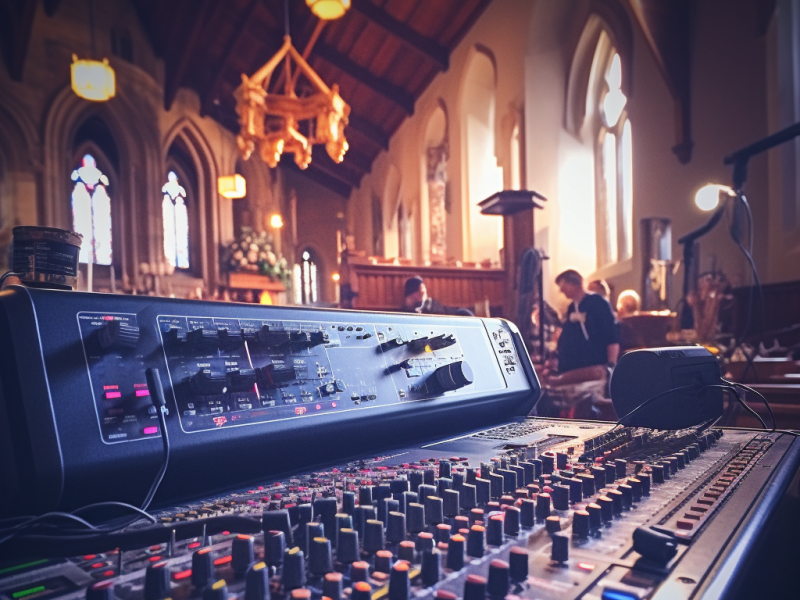
While different brands and models of sound mixers vary in numerous ways, not all of these differences are equally important for small churches. The key to making a wise decision lies in focusing on factors that directly impact your church’s audio experience without overwhelming your budget or volunteer team. The most critical considerations include the number of channels, ease of use, sound quality, durability, and cost. These five factors are pivotal because they determine how well the mixer will meet your specific needs—balancing functionality with simplicity, ensuring long-term reliability, and fitting within a modest budget.
Sound Quality
Audio quality is not just a technical requirement; it’s a conduit for connection and spiritual engagement. High-quality sound ensures that every sermon, hymn, and prayer resonates clearly with the congregation, fostering a deeper sense of community and participation. For small churches, where resources are often limited, prioritizing sound quality is essential to maximize the impact of every word and note.
Several key features typically determine superior audio performance in mixers. Firstly, high-quality preamps are crucial, as they amplify microphone signals without adding unwanted noise or distortion, ensuring that the spoken word and music are captured with clarity and warmth. Effective equalization (EQ) controls are another vital component, allowing for fine-tuning sound frequencies to suit the acoustics of the church space and the nuances of different voices or instruments. A low noise floor also ensures that background hiss is minimized, which is particularly important in quiet, reflective moments.
By investing in an audio mixer that excels in these areas, small churches can achieve professional-grade sound quality that elevates the worship experience, ensuring that every message is heard and felt deeply by the congregation.
Ease of Use
For small churches, where the operation of audio equipment often falls into the hands of volunteers or staff with varied technical expertise, the ease of use of a mixer is a critical consideration. A user-friendly mixer ensures that individuals, regardless of their experience level, can manage the sound system effectively, adjusting to accommodate different parts of a service. This accessibility is critical to maintaining a seamless worship experience, where the focus remains on the spiritual message rather than managing complex equipment.
User-friendly design features that contribute to the accessibility of mixing consoles include intuitive layouts, clearly labeled controls, and simple, straightforward interfaces. Some mixing boards also offer preset configurations, which can be a boon for volunteers who may not be audio experts but need to adjust settings for different services or events quickly. Additionally, mixers with visual feedback, such as LED indicators for volume levels or peak warnings, help operators monitor and adjust the sound in real time without guesswork.
Small churches can empower their volunteers to confidently deliver high-quality sound by choosing a mixer that emphasizes ease of use, ensuring that technical barriers do not hinder the worship experience.
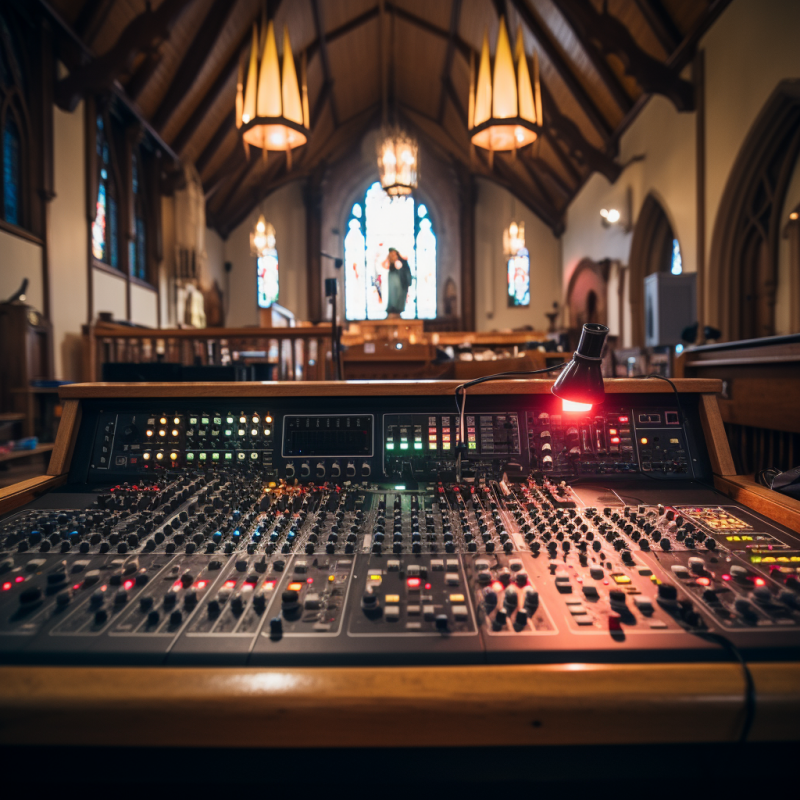
Durability
Durability is a non-negotiable aspect when selecting a mixer for small churches, as it directly impacts the longevity and reliability of the investment. In environments where equipment may be set up and packed away frequently or transported between locations, a mixer must withstand the rigors of regular use without faltering. Sturdy construction ensures that the mixer can handle the physical demands of church activities and maintains consistent sound quality over time.
Materials and build quality are key indicators of a mixer’s durability. Metal chassis and robust knobs and faders are signs of equipment designed to last. Furthermore, reliable mixers often come from brands with a reputation for quality and support, offering peace of mind through warranties and customer service. Investing in a durable mixer saves churches from frequent replacements and repairs, ensuring that resources can be focused on enhancing the worship experience rather than maintaining the equipment.
Number of Mixing Channels
The number of channels in a mixer plays a pivotal role in its functionality, dictating how many individual sound sources can be managed simultaneously. For small churches, determining the appropriate number of channels balances current needs and potential future growth. Typically, a small church might require channels for the pastor’s microphone, additional microphones for choir or guest speakers, and inputs for musical instruments or backing tracks.
A useful approach here is to assess the typical setup for your services and then add a few extra channels to accommodate special events or additional instruments. For most small churches, a mixer with 8 to 12 channels often provides sufficient flexibility for regular services and special occasions, ensuring that every voice and instrument can be heard clearly.
Cost Considerations
Cost is crucial for small churches when selecting audio equipment, as budgets are often limited. However, it’s important to remember that the cheapest option isn’t always the most cost-effective in the long run, as replacements or repair costs can offset the purchase price value. Investing in a mixing board that offers durability, sound quality, and the right features can save money by reducing the need for future upgrades or replacements.
When considering cost, factor in the potential for growth and the mixing desk’s ability to meet future needs. A slightly higher initial investment in a unit with more channels or better sound quality can prove more economical, avoiding the need for a premature upgrade.
By carefully evaluating the balance between cost and essential features, small churches can make wise investments that support their ministry and community without exceeding their budget.
Our Top Picks for the Best Mixer for Small Churches
When it comes to finding the perfect balance between quality, functionality, and user-friendliness, Allen & Heath stands out as a top contender. All their models work with an iPad, making it easier to operate from the stage or if your tech wants to sit with the family during worship. Their QU series, particularly the QU-16 and QU-32, are exemplary models for small churches looking to elevate their audio experiences without overwhelming their technical teams or budgets.
Allen & Heath QU-16
The QU-16 offers a compact solution without sacrificing studio-quality sound. Its intuitive layout and plug-and-play operation make it accessible for volunteers of varying technical skill levels. With 16 channels, it provides ample input for most small church settings, ensuring clear, clean sound for every service. The mixer’s initial programming is straightforward, allowing for quick setup and adjustments. Its durability and portability make it an excellent choice for churches that host outside events or have multi-use spaces.
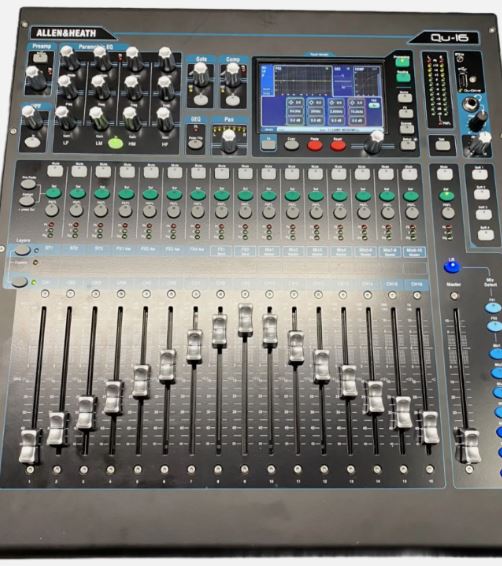
Allen & Heath QU-32
For small churches with slightly larger needs or those planning for future growth, the QU-32 steps up the game. It retains all the user-friendly features of the QU-16 but has 32 channels, offering more flexibility for inputs and outputs. This digital mixer is also renowned for its clean sound and robust build, making it ideal for both in-house use and on tour. The intuitive menu and easy-to-teach layout ensure that even less experienced users can operate the system effectively, making it a versatile choice for various church activities.
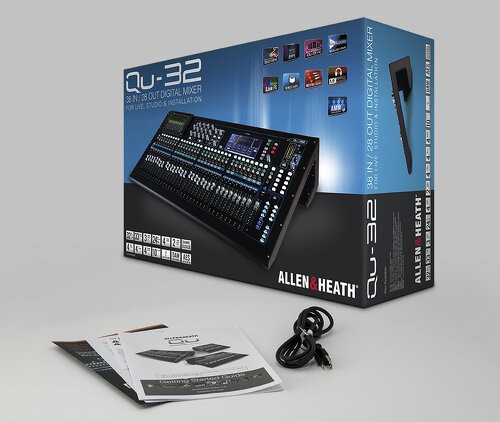
While several models exist between these two, the QU-16 and QU-32 by Allen & Heath exemplify the ideal mix of performance, ease of use, and reliability, making them our top picks for digital mixers in small churches. Their ability to provide professional features and studio-quality sound in a user-friendly and durable package ensures they can support the unique needs of worship spaces, enhancing every aspect of the audio experience.
Empowering Worship Through Sound: Making the Right Mixer Choice
In enhancing worship experiences, selecting the perfect mixer for your small church is pivotal. Balancing sound quality, ease of use, durability, channel requirements, and budget considerations ensures that your choice meets your current needs and supports future growth. Our exploration of the Allen & Heath QU series, with its user-friendly design and studio-quality sound, exemplifies the ideal digital mixer for small churches seeking to make a significant impact.
If you want to consult with professional AV technicians about your church sound system needs, the team at RYGID AV is happy to help. We offer free consultations and would love to help your worship ministry reach its audience with the perfect sound.



